Health
Esophageal exercises to treat GERD
Several articles in medical journals have proposed the idea of using esophageal exercises to treat GERD (gastroesophageal reflux disease). But how exactly does one exercise the esophagus?Here's one way, as described in the article "A Simple Exercise to Strengthen the Lower Esophageal Sphincter and Eliminate Gastroesophageal Reflux: An Autobiographical Case Report" by Eric Karrfalt:
Similarly, the authors of "Bridge Swallowing Exercise for Gastroesophageal Reflux Disease Symptoms: A Pilot Study" report that "bridge swallowing" can improve GERD symptoms. They helpfully provide a picture of the bridge swallowing position.

I have no idea if these techniques would work. Thankfully I don't suffer from GERD so I can continue eating upright.
via hacker news
Posted By: Alex - Sat Jan 11, 2025 -
Comments (0)
Category: Exercise and Fitness, Health, Stomach
Anyone At All: Safety in the Community
Posted By: Paul - Sat Nov 30, 2024 -
Comments (0)
Category: Death, Domestic, Health, PSA’s, 1950s
Follies of the Madmen #611
Posted By: Paul - Thu Nov 14, 2024 -
Comments (0)
Category: Health, Advertising, Space Travel, Twentieth Century
No-Burp Syndrome
The inability to burp is known as retrograde cricopharyngeus dysfunction, or "no-burp syndrome." Anecdotes about people unable to burp date back centuries and had occasionally been reported in medical literature, but most doctors, until recently, were skeptical that the condition existed. Details from KFF Health News:"But we never saw the condition, so we didn't believe that it existed in real life," he said.
Smout's doubts persisted until he and colleagues studied a small group of patients a few years ago. The researchers gave eight patients with a reported inability to burp a "belch provocation" in the form of carbonated water, and used pressure sensors to observe how their throats moved. Indeed, the air stayed trapped. A Botox injection resolved their problems by giving them the ability to burp, or, to use an academic term, eructate.
"We had to admit that it really existed," Smout said.
Reddit is credited with bringing awareness to this condition after those afflicted with it began sharing their stories at the "No Burp" subreddit.
Posted By: Alex - Wed Oct 30, 2024 -
Comments (0)
Category: Health, Medicine, Stomach
Bowel evisceration after sneezing
We've previously drawn attention to some of the dangers of coughing and sneezing. Such as the cases of people who sneezed so hard that their eye fell out. Or the woman who coughed out her lung.Now the American Journal of Medical Case Reports has published a case of "bowel evisceration after sneezing." A man sneezed violently while dining at a restaurant and then realized that his intestines had come out of a surgical incision in his stomach. He thought the incision was fully healed. From the journal:
During breakfast, the man sneezed forcefully, followed by coughing. He immediately noticed a “wet” sensation and pain in his lower abdomen. Looking down, he observed several loops of pink bowel protruding from his recent surgical site. He later related that he was unsure of how to proceed, so he covered the exposed intestines with his shirt. He initially decided to drive himself to the hospital, but concerned that changing his position might injure his bowel, his wife requested an ambulance.
To be fair, sometimes sneezing can cause miraculous recoveries, such as the case of the woman whose deafness was cured by a sneeze.
Posted By: Alex - Sun Jun 30, 2024 -
Comments (0)
Category: Health, Surgery
Rancher Glen, the Christmas Seal Cowboy
I'm a little late with this seasonal entry, but I still hope all WU-vies can follow Rancher Glen's advice for a healthy 2024.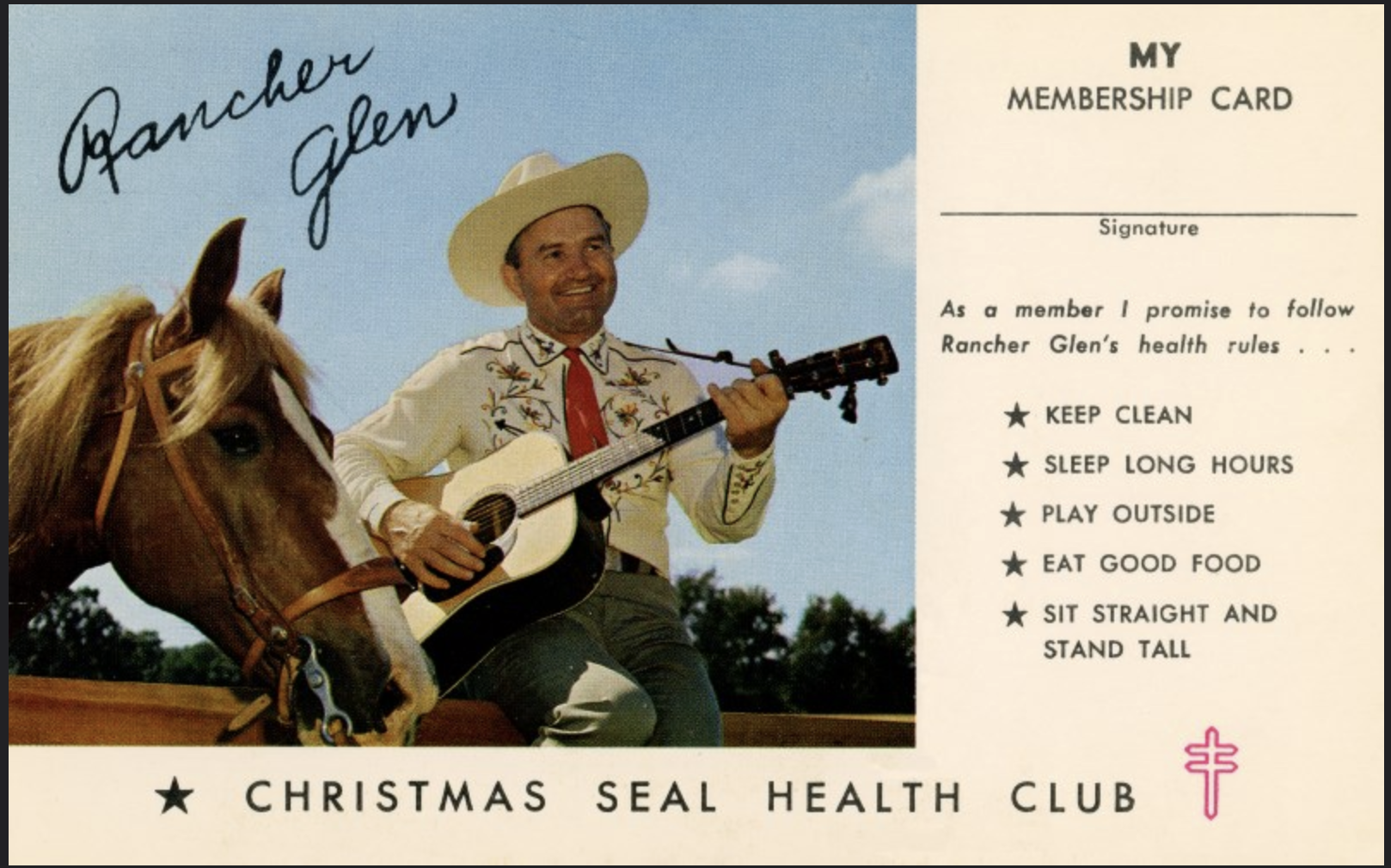
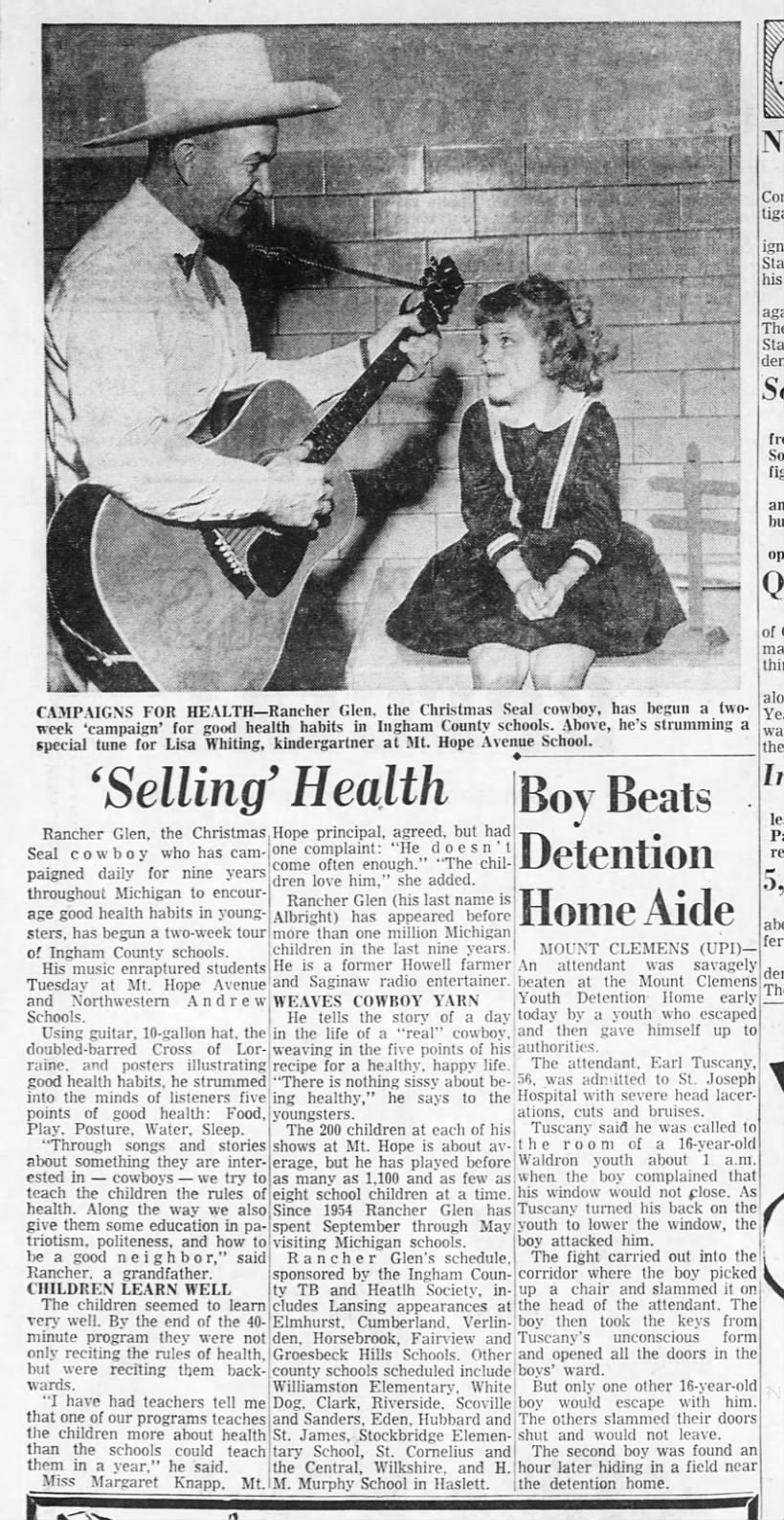
Posted By: Paul - Sun Jan 07, 2024 -
Comments (1)
Category: Health, PSA’s, Corporate Mascots, Icons and Spokesbeings, Children, Wild West and US Frontier, Twentieth Century
Hand Waving and Heart Disease
Back in 1997, Dr. Alan N. Rennie reported in the British Medical Journal a correlation between arm movement and heart disease. People who moved their hands and arms around a lot while talking seemed more prone to heart disease. Rennie offered this possible explanation:Good to know that my lazy lack of movement actually has a health benefit.
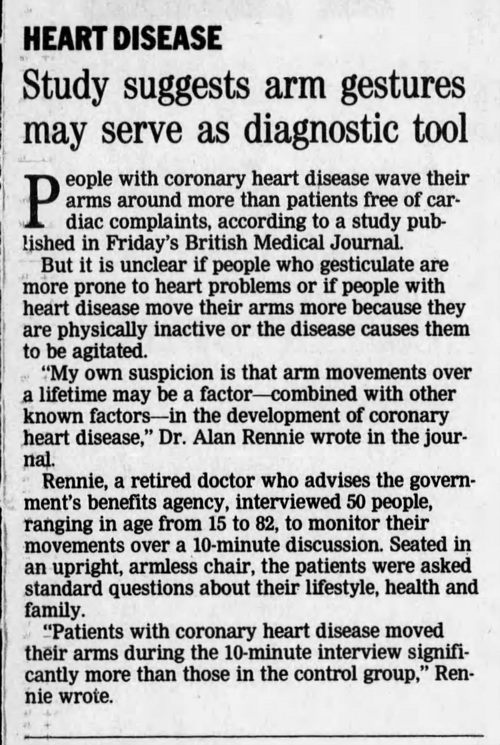
Chicago Tribune - Jan 10, 1997
Posted By: Alex - Sun Dec 03, 2023 -
Comments (1)
Category: Health, Disease
Pin-Worms may be a family affair
"Fidgeting, nose-picking and a tormenting rectal itch are often tell-tale signs of Pin-Worms . . . Entire families may be victims and not know it."I'm imagining the families who thought the tormenting rectal itches were nothing out-of-the-ordinary.
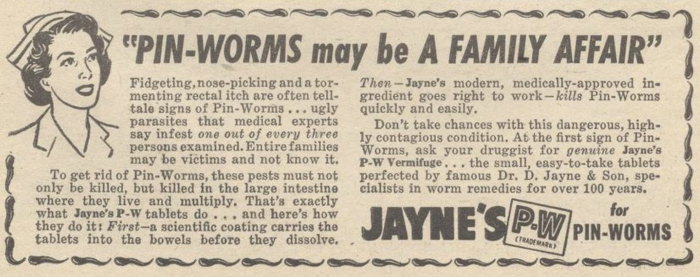
Super Science Stories - March 1950
Posted By: Alex - Thu Sep 28, 2023 -
Comments (0)
Category: Health, Disease, Advertising, 1950s
Calories Don’t Count
Dr. Herman Taller was arguably ahead of his time with his assertion that a high-protein diet was more effective for weight loss than simply restricting calories. However, it was his promotion of "CDC" (Calories Don't Count) capsules that got him into trouble. He claimed that these capsules not only would help with weight loss but would also lower cholesterol, treat heartburn, improve the complexion, increase resistance to colds, and boost the sex drive. The FDA disagreed, noting that the capsules primarily contained safflower oil. Taller was eventually convicted of mail fraud.More info: Wikipedia, Quackwatch
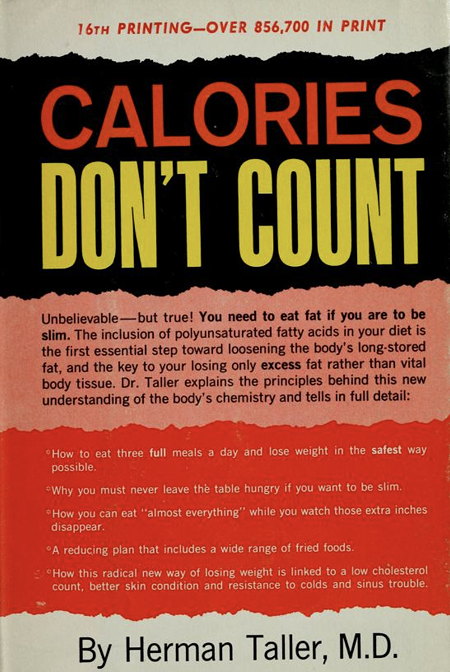
Posted By: Alex - Sun May 28, 2023 -
Comments (0)
Category: Health, Dieting and Weight Loss
Mysterious Hiccups Cure
Sep 1949: After Robert Meier had suffered from hiccups for 8 days, a mysterious stranger showed up at his house unannounced, draped a wet noodle over Meier's head, and cured his hiccups.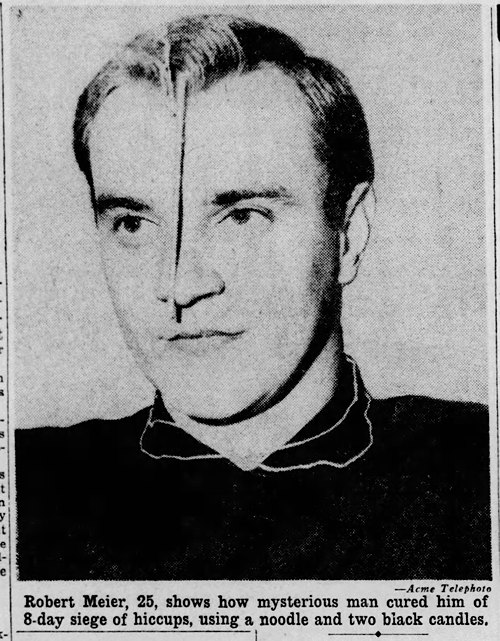
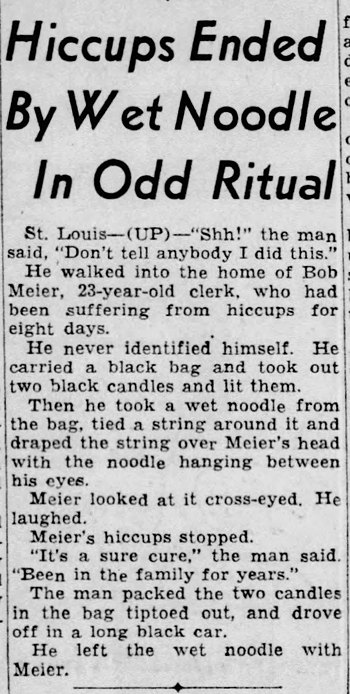
Rochester Democrat and Chronicle - Sep 9, 1949
Posted By: Alex - Sat May 27, 2023 -
Comments (2)
Category: Health, 1940s

| Who We Are |
|---|
| Alex Boese Alex is the creator and curator of the Museum of Hoaxes. He's also the author of various weird, non-fiction, science-themed books such as Elephants on Acid and Psychedelic Apes. Paul Di Filippo Paul has been paid to put weird ideas into fictional form for over thirty years, in his career as a noted science fiction writer. He has recently begun blogging on many curious topics with three fellow writers at The Inferior 4+1. Contact Us |




